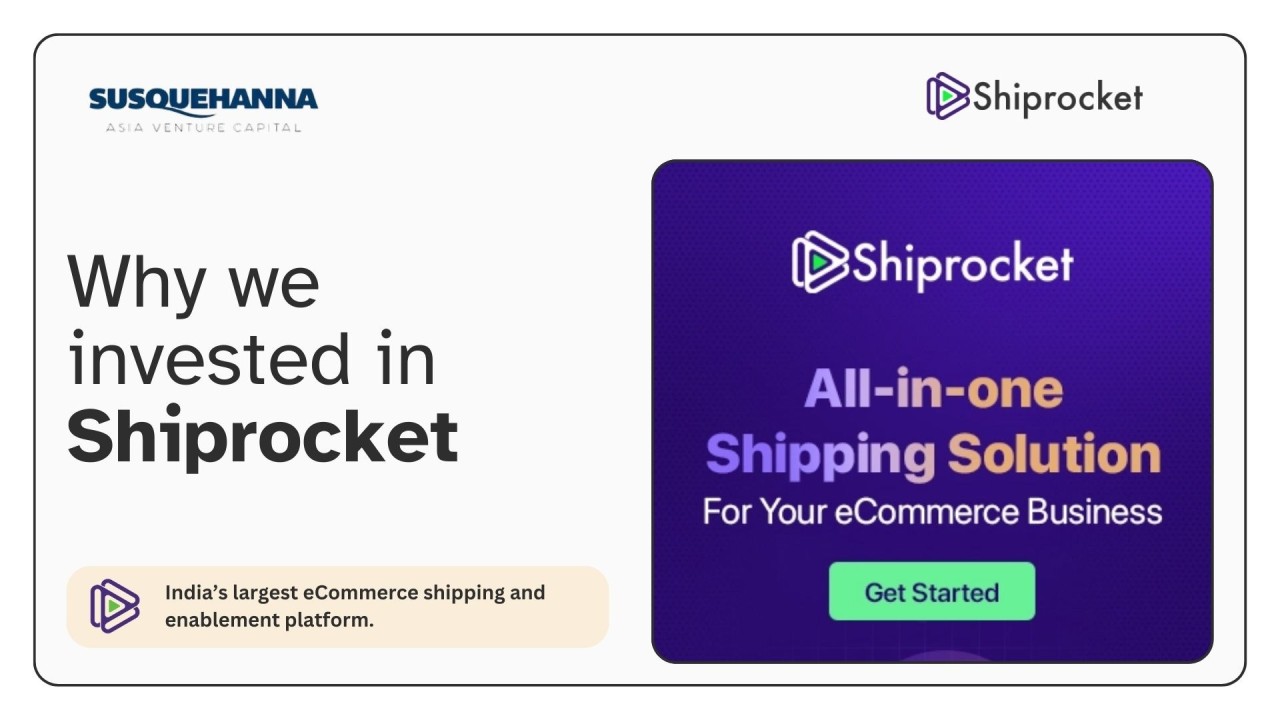
Unlocking the Potential of D2C Commerce in India: Our Bet on Shiprocket
The e-commerce industry in India has shown a strong increase in penetration from c. 3% in 2020 to c. 6-7% in 2024, a ~$80-90B market today, and is expected to go to c. 12-14% by 2030, becoming a $350B-$400B+ market. In this journey, the first wave of e-commerce companies solved both the demand-side challenges (consumer behavior & experience, trust, payments & refunds, demand generation, etc.) and the supply-side challenges (address standardization, delivery infrastructure, reverse logistics, fraud detection, etc.), resulting in full-stack platforms with an endless catalog of products across categories, the likes of Flipkart, Amazon, Meesho, quick commerce (more recently), etc. Consequently, the marketplaces account for 85% of the Indian e-commerce market today.

As the e-commerce industry in India continued to evolve, a new wave of specialized, category-specific D2C brands emerged, powered by e-commerce enablement platforms that democratized access to the demand and supply-side capabilities previously reserved for large marketplaces. At the forefront of this shift is Shiprocket, a company that has played a pivotal role in enabling the growth of the D2C commerce segment in India. We believe that even with a few large outcomes (Mamaearth, Wakefit, etc.), we are still in the early days of this wave, with the D2C segment growing at ~32-33% compared to the industry growing at ~18-20%. Direct commerce as a % of e-commerce in India is still in its infancy at ~15% and has room to grow to ~35-40% like the US as the discerning customer choices continue to be served by a labyrinth of newer brands.
Shiprocket isn’t just another logistics aggregation platform. It’s an e-commerce enablement ecosystem for any brand or merchant wanting to sell online (across any channel, including website, social, chat, etc.) with at-par or better customer experience than first-gen platforms/marketplaces. What began as an attempt to create a Shopify-esque solution for India has metamorphosed into something far more profound: an end-to-end integrated system that seamlessly blends 1-click checkouts, payment gateways, customer communication, etc. on the demand side with order and shipping aggregation, inventory management, RTO infrastructure, COD collection, fraud detection, etc. on the supply side. This approach creates a unified data platform to unlock efficiencies historically reserved for the large merchants/brands investing in data infrastructure and capabilities.
Shiprocket’s journey began in 2012 as KartRocket, which aimed to empower SMEs in India to build and manage their online stores. However, the team soon realized that the core challenge for Indian businesses wasn’t just about creating a digital shopfront – it was the complex and fragmented logistics and fulfilment infrastructure that posed a significant barrier to e-commerce success. This insight led Shiprocket to pivot its focus to address the critical pain points of moving goods efficiently, transforming the company into a shipping aggregator that could provide a seamless end-to-end solution for Indian merchants. This wasn’t a minor adjustment; it was a complete overhaul, built on the fundamental understanding that “if you can’t send your stuff, you can’t receive money for your stuff at the customer’s doorstep, ergo, you can’t do e-commerce”.
Serving over 75,000 quarterly active paying merchants and handling millions of shipments, Shiprocket has proven its scalability and reliability. Beyond catering to the fastest growing segment of the e-commerce market, the business brings immense optionalities – expanding capabilities across the funnel to generate demand, improve conversions, etc., enabling cross-border fulfilment for merchants to open up entirely new markets for them, bring access to supply chain financing thereby enabling merchants to scale their operations, among many other capabilities. Operating on an asset-light model allows the company to remain data-first and technology-focused, delivering innovative solutions to merchants without significant capital expenditure. The result is a highly efficient system with negative working capital and a strong ROCE business.

The pendulum swing from best-of-breed (modularization) to suites (integration) seems to happen with each major platform transition. With the advent of GenAI, we are seeing a shift to bundling and greater integration, particularly for SMBs that need seamless transaction services. This shift is driven by three key factors:
- Technology Advancements – Cloud and GenAI have reduced innovation costs, allowing market leaders to expand into adjacent services. Shiprocket has become India’s largest eCommerce enablement platform for merchants selling outside major marketplaces like Amazon and Flipkart and is already the leader in checkout.
- Customer Preference for Integration – SMBs prefer an all-in-one platform that simplifies workflows, pricing, and data intelligence, rather than piecing together multiple solutions. Shopify’s success illustrates this trend, with merchants valuing its “easy button” approach to integrating services.
- Scalability of SaaS Models – Usage based SaaS enables companies like Shiprocket to serve businesses of all sizes by offering flexible pricing, preventing low-cost disruptors while also scaling with growing customers.
The result of this trend is more wallet share accruing to these integrated platform vendors, resulting in a growing average revenue per customer. Shiprocket, initially focused on shipping aggregation, has leveraged its distribution network to expand into adjacent services, now monetizing 5-25% of last-mile shipments through additional products. With the core platform and the distribution in place, we believe the company has established its inherent right-to-win across each of the optionalities that the business offers.

We are thrilled to support Shiprocket’s journey as it continues to empower entrepreneurs and businesses of all sizes to build, manage, and grow their businesses online. Our investment reflects our belief in their vision to be the leading global commerce enablement platform, supporting the shift towards more decentralized and independent commerce. Shiprocket is more than a shipping aggregation platform; it is a cornerstone of India’s D2C e-commerce revolution, and we are proud to be a part of its journey.
This brings our India portfolio to 21 (list here) and Shiprocket joins our other B2B SaaS businesses in the India portfolio (Lentra, Rezolve AI). If you’d like to share feedback on our thoughts above or if you’re building the future of e-commerce, please write to the authors at firstname.lastname@sig.com – we’d love to share our learnings and help out along the journey.

